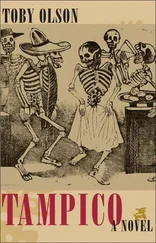When he had crossed the street and passed the rose tree sign, he saw what he thought was the rose tree fence enclosure on his side about halfway down the block. Above the fence, and further down at the corner, he could see the tops of some bottles sticking up. There was a parked car on the other side of the street, about where the fence was. He saw a man in a cowboy hat sitting in the driver’s seat. The car was in front of a white frame house, and there was another man standing in front of the door. He wore a summer suit. He was pretty sure that the house was the one in which his father had gotten his treatments, but he remembered a sign on the side of the house, something about the kinds of treatments given, and there was no sign as far as he could see where the man now stood. The walkway to the house looked like the one he had carried his father up, but he was not sure of it.
When he got to the fence surrounding the rose tree, he was almost across from the car. A bench had been added to the enclosure, bolted to the fence itself, and above the bench was a sign, the words burned into a piece of heavily lacquered wood; it read: howdy, pardner. rest a spell. He moved to the bench and sat down on it under the sign. He checked his watch; it was three-forty. He looked across the street at the car. The man at the door looked over his shoulder at the man sitting in the driver’s seat. The man in the seat lifted a hand. The other man turned and walked back to the car and got in. The man in the cowboy hat started the engine, and the car drove to the corner, stopped there, and then turned right.
He put his hand on the shopping bag on the seat beside him and got up. He walked along the rose tree fence, passed a house, and then came to the one with the bottles on its roof. There were not as many bottles as he had remembered, but there were still plenty of them; they covered the entire roof, but now there was more space between them. The sun hit against the bottles; there were some flashes where the few newest bottles stood, but most of the light was absorbed; the older bottles had a way of doing that. He suspected that the market for the fine things that the bottles were had slipped some over the years. The colors in and on the bottles were amazing in their gradations and shades, and the reflective and absorptive qualities of the bottles lit the roof up with similar variety. The sun gave a solid and sharp light to the day, but the roof was a complex of shadows, twinkles, and colors.
He moved to the back of the house. There was a dirt road running behind it, and beyond the road, though he could see a few scattered houses in the distance, there was mostly open desert, and he was on the literal edge of the town. He stood there for a minute, then he saw a pickup truck turn into the dirt road, about a block away from him from the direction of the town. The truck came slowly up the road. When it got about twenty feet from him, it stopped. He could see the cowboy through the dirty windshield, his Stetson square on his head. The truck stopped short of the edge of the property of the house with the roof of bottles. There was a low picket fence and a small yard with a meager cactus garden behind the house. A sand path ran between the cactus to the stoop; the door was a screen door. The cowboy had his arm out the window of the pickup cab resting on the doorframe; he lifted his hand from where it gripped the frame and motioned. Allen walked over to the window of the pickup. On the seat of the cab beside the cowboy, he could see a revolver, what he thought was a six-shooter.
“Never mind that,” the cowboy said. “Give me the shit.”
He lifted the bag up. As he extended his hand to the cab of the truck, he noticed that the cowboy was not looking at him, but past and behind him. Then the truck lurched forward, the rear frame of the door hitting his hand, spinning him around and sending the bag flying off beyond the dirt road and into the edge of the desert. The truck was already well underway when it got to the corner of the house, and its tires squealed some when it bent to the right and shot down the blacktop in the direction of the rose tree.
He saw the car slide to a stop about forty yards from him, the man in the summer suit jump out, and the car, with the door still open and flapping, accelerate after the truck. The man, in jumping from the car, had tripped; he fell, went with his roll, and came to his feet. A sleeve of his jacket was ripped, and he jerked at it with his other hand as he ran, breaking his stride. There was a gun in the hand of the arm with the ripped sleeve, and as Allen turned toward the house he saw the gun disappear as the man pulled at the sleeve to rip it away and free himself.
In two strides Allen was over the low picket fence and in the sand. When he got to the screen door, he ripped it off its hinges as the hook lock pulled loose, and it flew back behind him. The force of the wrenching set the house into slight motion.
“Shit!” he heard, and then a crashing, as the man with the torn sleeve and the gun got tangled in the flying door.
He could see the light at the end of the house, and he headed for it. He could hear the bottles, fall and roll and break above him. He passed an old woman who was half risen from her crocheting of a tablecloth at a large oak dining-room table. He hit the screen door at the front of the house with both of his hands out; his right hand ripped through the screening, and the other hit against the left frame, sending the door free of the latch and open. It slapped like a rifle shot against the side of the house.
He cleared the front stoop in the air, heard the tinkle and crash of bottles above and behind him, ran down the front walk, crossed the street, hit along the side of the house across from the bottle house, and then came to the rose tree fence. He vaulted over it, using the howdy pardner seat bench, landing on both feet in the dirt near the rose tree itself, its huge trunk in front of him. There were no visitors, and he grabbed onto a low limb and climbed up into the rose tree, scrambling into the higher branches, where he saw that he could reach the roof of the house against which the enclosure was built. He reached for the eave, the hot shingles burning his fingers, and hoisted himself up and over. There was a large, uncapped chimney rising a good six feet up from the middle of the peaked roof, and he headed for it.
He moved around the chimney; it was a good three-and-a-half-feet square, but he felt exposed on all sides, and he grabbed at the edge of the chimney above him and pulled himself up to the top of it. It had one flue; it was open, and he saw light below.
He climbed down into the chimney, searching for a purchase on the edges of the brick interior. He found small narrow ledges for his feet, and then he crouched down.
He was breathing heavily, but he could hear the bottles. They were still falling over, some breaking, some rolling around on the flat roof; some hit against each other, tinkling. They sounded like a massive and airy wind chime at times, at others like a piece of odd contemporary music. His breathing was the bass line, the rhythm. A line of bottles would fall like dominoes, some ringing others-the darker ones, he thought, having a hollow sound, the newer ones like crystal. They fell, rolled, crashed against each other, dropped from the roof with dull thuds. And then he held his breath.
He heard the man coming, could hear him opening the door in the rose tree fence, could even hear his breathing. The breathing settled quickly as the man moved around the tree. He heard the final ripping away of the sleeve and a small click. The safety or the hammer, he thought. He heard the man scuffling as he climbed the tree. Then he felt a small quiver in the chimney as the man came up over the edge of the roof and onto it. He heard his feet sliding and scraping on the shingles as he moved to the peak of the roof, then a firmer thudding as he walked along the caps to the chimney. Then the man stopped, and all he could hear was his deep, regular breathing.
Читать дальше












